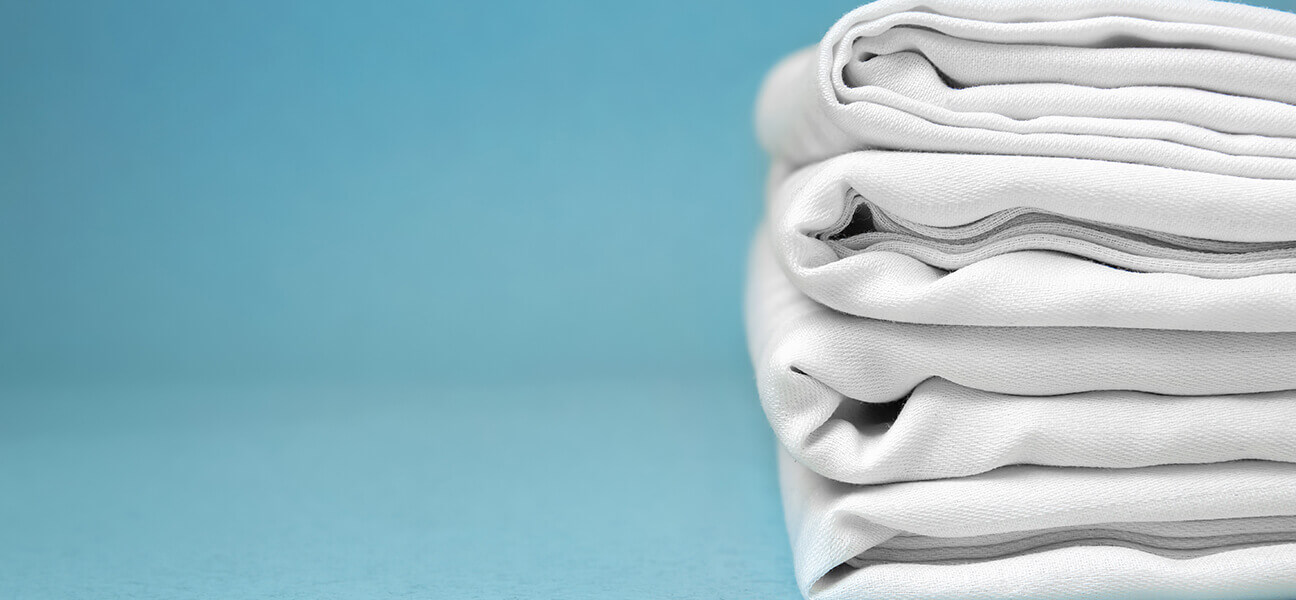Sheets are sheets, but their fabrication affects everything from the customer experience to your bottom line. Popular choices for hotels are cotton, polyester or the merge of the two—polycotton. Below, we’ll explore the pros and cons of all three hotel sheet types to help you decide what to stock up on.
Cotton sheets for hotels
Cotton and comfort go hand-in-hand when it comes to sheets. After all, cotton sheets are soft, breathable and luxurious. So it should come as no surprise that cotton is the most popular fabric used to make sheets.
But, in the hotel industry, it’s not as simple as always choosing cotton. The comfort cotton offers comes at a cost. For example, cotton requires lower temperatures for washing, so it’s harder to keep clean—an important factor to consider in our post-pandemic world.
Pros of cotton sheets
- All-natural fibers
- Sleep cool
- Naturally breathable
- Hypoallergenic
- Wide variety of options
- Good for sensitive skin
Cons of cotton sheets
- Wrinkle easily
- Less durable
- Pricier
- Difficult to keep clean
- An average lifespan of only 50 to 60 industrial washes
It’s worth noting that specific advantages and disadvantages of 100% cotton sheets also vary by construction. For example, there are many differences between cotton sateen and cotton percale.
Polyester sheets for hotels
Unlike cotton sheets, polyester sheets are 100% synthetic. This affects everything from their durability to their feel to their fade-resistant properties. Although less popular than cotton sheets, polyester is still a popular fabric choice for bedding. What it lacks in outright comfort, it tries to make up for in durability and ease of care.
Pros
- Extremely durable
- Dry fast
- Resist wrinkling and shrinking
- Fade-resistant
- Affordable
- Low maintenance
- Lightweight and smooth feel
Cons
- Sleep hot
- Some types are prone to pilling
- Trap static electricity
- Not as soft
Polycotton sheets for hotels
Given their shorter lifespan and higher cost, 100% cotton sheets aren’t practical for many hotels. But that doesn’t mean your hotel has to give up cotton completely. Instead, polycotton sheets attempt to deliver the comfort and breathability of cotton with the durability and longevity of polyester. Compared to 100% cotton sheets, polycotton hotel sheets provide ample benefits with fewer drawbacks than 100% polyester sheets.
Pros
- More affordable
- Lower maintenance
- More durable
- Keeps shape and color
- Resists wrinkling
- Softer than 100% synthetic sheets
- Less prone to pilling
Cons
- May trap heat
- Not as soft as 100% cotton
Consider Venus Performance Twill® Sheets
Similar to cotton, polycotton sheet offerings also vary. If you want the absolute best of polyester and cotton, consider Venus Performance Twill® Luxury Sheets. They’re the perfect choice for hotels and industrial launderers who want to keep guests happy while keeping their business healthy. That’s who Venus Group invented them for.
Venus Group saw a need in the industry for a comfortable sheeting fabric that delivered exceptional comfort while helping hotels manage the cost of ownership. Our 70/30 cotton-rich Performance Twill® Sheets last for up to 200 launderings, according to independent testing. That’s four times the longevity of the average 100% cotton sheet and double the lifespan of a traditional polycotton blend. And, thanks to a unique weave, these commercial hotel sheets also deliver the comfort and feel of 100% cotton that many hotel guests expect.
Turn to Venus Group for your hotel linens
Venus’ Performance Twill® Sheets are just the start of Venus Group’s many bed linen offerings. Whether you’re interested in sheet sets, pillowcases or duvets, Venus has what you need to keep your guests sleeping comfortably. Speak to one of our textile experts today for help choosing the right products for your hotel or industrial laundering business. Simply give us a call at 800.421.6599 or email us at [email protected].

